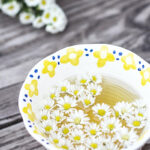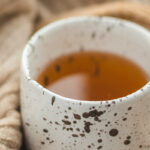Best Tea for Sleep: Flavors, Benefits, and More
Tea has been used as a holistic treatment for a myriad of illnesses and ailments for centuries. The earliest record of tea being used for its healing powers dates as far back as 2737 BC. Since then, people have developed a wide variety of strains, flavors, and tea combinations that are both delicious and beneficial.
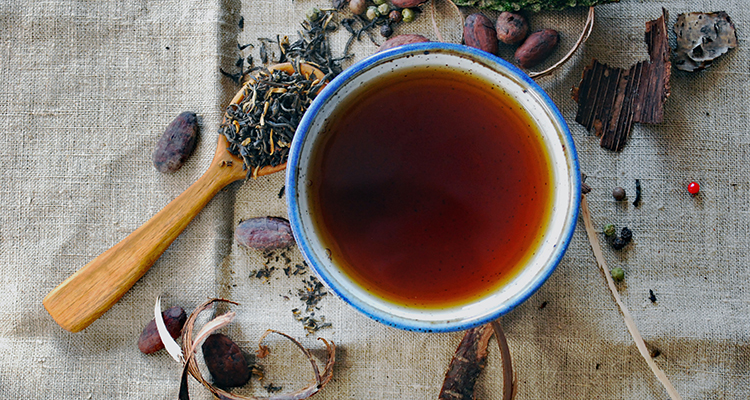
Studies show that tea can boost your immune system, reduce inflammation, and may even reduce your risk of developing heart disease and certain cancers. While some teas offer more health benefits than others, simply incorporating this soothing beverage into your daily routine can improve your overall health and wellness.
If it’s insomnia relief you’re looking for then you’ve come to the right place. In this article, we’ll take a deep dive into the best tea for sleep including types, flavors, benefits, and when to drink it so you can get the most out of its relaxing effects.
Content
The Best Tea for Sleep
Even if you don’t suffer from insomnia, brewing yourself a hot cup of tea can help you fall asleep faster and stay asleep longer. Tea has calming abilities that promote relaxation and help your body wind down at the end of a long day. But if you want the most out of the experience, consider these teas that are known for their sleep-inducing benefits.
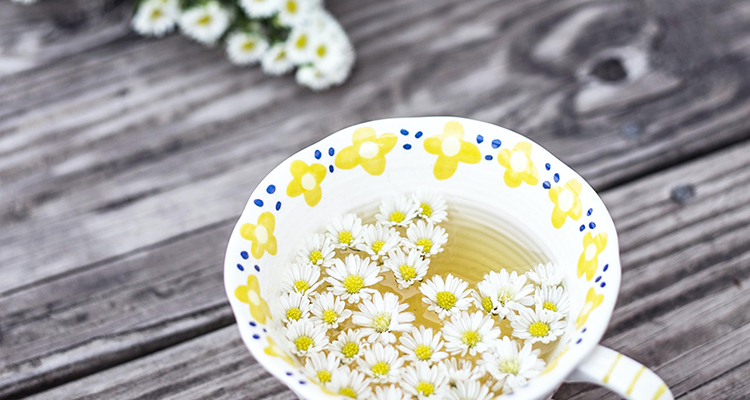
Chamomile Tea
The flowers of the chamomile plant have been used for centuries to treat a wide variety of conditions, including insomnia and certain sleep troubles. The chemical compounds in the chamomile plant are what makes it so beneficial for sleep. The most powerful compound in this tea is apigenin. By binding to the benzodiazepine receptors in the brain, apigenin provides mild sedative effects that help facilitate sleep and improve sleep quality.
If anxiety or stress is acting as a barrier to sleep for you, chamomile tea can help with this too. One study done on postpartum women showed that participants who drank chamomile tea saw a decrease in both depressive symptoms and a reduction in restless sleep. For this reason, chamomile tea is also said to ease symptoms associated with generalized anxiety disorder (GAD). Chamomile tea has also proven beneficial for older adults struggling with sleep disturbances and certain sleep disorders.
In terms of taste, chamomile has a honey-like sweetness with gentle undertones of apple. It’s a mellow, herbal flavor that’s palpable for most people.
Valerian Root
Valerian root has long been revered for its ability to not only improve sleep but also reduce stress, one of the leading causes of insomnia. The herb has also been used to treat certain conditions that may negatively impact sleep including anxiety, nervousness, heart palpitations, and headaches. The best part is, valerian root tea offers stress-relieving and sleep-inducing benefits without the unpleasant side effects of traditional sleep medications.
Valerian root and tea brewed from it contain two effective sedatives that help promote quality sleep – valepotriates and sesquiterpenes. Studies show that these two compounds increase the amount of GABA (gamma-aminobutyric acid) in the brain. GABA is responsible for regulating nerve cell activity while also reducing anxiety and nervousness. One study showed that 90% of participants saw sleep improvements after drinking valerian root tea. Valerian extract is also said to help improve overall sleep quality and help you fall asleep faster. The only downside to using valerian root for tea is that some people report an unpleasant odor and earthy taste. Try adding sweetener, maple syrup, or honey to your tea for added flavor.
Mint Tea
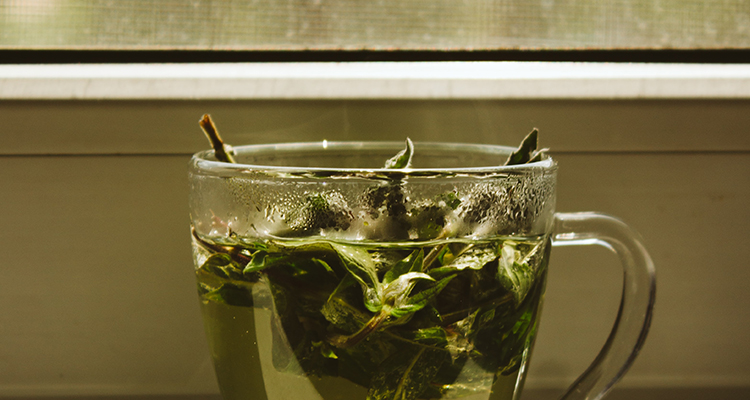
Mint tea is naturally caffeine free and works to treat a variety of issues and ailments that could also improve your sleep quality. For example, mint tea helps ease digestion (including symptoms associated with IBS) and also acts as a muscle relaxant. This makes mint tea especially beneficial for those with digestive trouble, certain gastrointestinal diseases, as well as inflammation, and other muscle-related ailments.
The cooling menthol of both traditional mint and peppermint tea can also help ease allergies and clear nasal congestion. Minty fresh breath is another added bonus of drinking mint tea for sleep and might make your bedmate happy. Polyphenols in mint tea are also said to keep your brain sharp, focused, and healthy. This can reduce early-morning grogginess and boost daytime production.
Lemon Balm
Lemon balm is a member of the mint family, but instead of a menthol taste and smell, this flower boasts a sweet, citrus aroma and flavor. Historically, lemon balm has been used in antibacterial medicine to help treat certain viruses and infections. Recent studies suggest that lemon balm tea can help reduce restless sleep and improve sleep quality.
Not only does lemon balm tea work to reduce insomnia symptoms but it may also help reduce depression, anxiety, nervousness, and anxious thoughts keeping you up at night. In fact, lemon balm has been said to have the same positive effects on a person’s mood as certain antidepressants. Just 500 milligrams of lemon balm could help improve a person’s sleep habits and overall quality of life.
Try lemon balm tea for sleep if you’re struggling with anxiety before bed or restlessness throughout the night.
Lavender
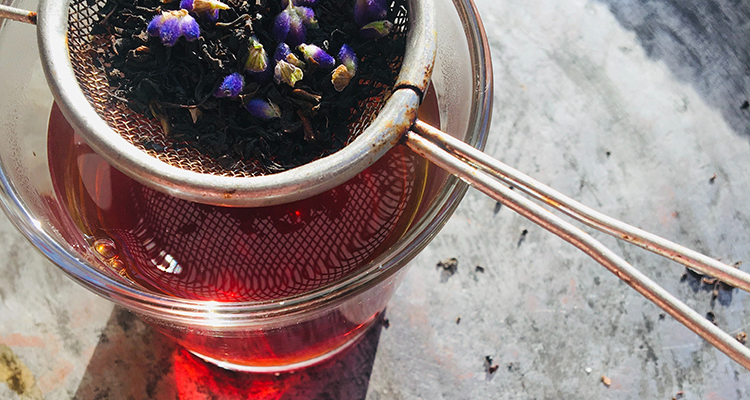
Lavender is more than just a beautiful, fragrant flower. It’s also one of the most popular essential oil scents used for therapeutic massage and other aromatherapy practices. The use of lavender for its calming effects dates back to the Roman empire. Not only is the scent of lavender soothing, but the flower can also be brewed into a tea to help promote relaxation and calm at night. Despite its strong floral scent, lavender tea actually has a mild taste with hints of mint and rosemary. Depending on the blend, you may notice a smoky or woody aftertaste while others are more sweet and floral. Regardless of the tea’s flavor, the benefits are the same.
While there hasn’t been extensive research done on the effects of lavender tea on sleep, lavender oil is often used to improve sleep quality and sleep duration. Other evidence suggests that lavender oil can reduce nighttime awakenings while also easing depressive symptoms and improving mood. One thing to keep in mind when adding lavender tea to your sleep routine is that the effects tend to be more short-term. Try sipping a hot cup of lavender tea between 30 and 60 minutes before climbing into bed to help you fall asleep faster.
Magnolia Bark
While it may not sound all that appetizing, magnolia bark (also known as Houpu) has been used as a sleep aid in ancient Chinese culture for thousands of years. Magnolia bark’s active ingredient is honokiol which has been said to reduce sleep latency (the time it takes you to fall asleep) by binding to GABA receptors in the brain. This works similarly to valerian root tea.
If you use magnolia bark tea to fall asleep, you may still wake up throughout the night, however, it should take you less time to fall back asleep. You can drink magnolia bark as a tea or take it as a supplement, depending on your preference. Some people prefer the supplement since magnolia bark has a strong, sometimes unpleasant taste.
Passionflower
Passionflower tea is similar to chamomile in the fact that it contains chemical compounds and flavonoids that bind to benzodiazepines in the brain. Once bound, they help reduce anxiety, stress, and nervousness that may be triggering your insomnia symptoms. One study showed that drinking a single cup of passionflower tea was enough to help participants sleep better and longer. Passionflower tea has a mild flavor with grassy undertones. Many people flavor or sweeten passionflower tea using honey.
You can also combine passionflower with other sleep-enhancing herbs like valerian and chamomile to treat short-term or acute insomnia. Similar to magnolia bark, passionflower is also available as a supplement or capsule and may offer more concentrated longer-lasting benefits.
Green Tea
Green tea is different from black tea and is derived from Camellia leaves and buds that haven’t undergone the withering or oxidation process. Green tea originated in China centuries ago but is now manufactured and produced across the world. It’s also praised for its many benefits, including improved sleep. What makes green tea different from other varieties on this list is that drinking it throughout the day can offer benefits that carry on well into the night. Studies show that consuming green tea during the day can reduce fatigue, helping you fall asleep faster at night while also achieving deeper sleep.
Green tea contains a beneficial compound called theanine. Theanine is said to relax the brain, reducing neutron excitement and decreasing the production of stress-related hormones. Because green tea can help you stay alert during the day, some varieties do contain caffeine. If you’re using green tea to improve your sleep, opt for one with a lower caffeine content and avoid drinking it too late in the day. Green tea also contains polyphenols that boost digestion, support brain health, promote weight loss, and reduce inflammation. The healthier you are, overall, the more likely you are to achieve deep, quality sleep.
Another way that green tea can improve sleep is by helping ease sleep apnea symptoms and side effects. Some of the main characteristics of obstructive sleep apnea (OSA) are periodic pauses in breathing, choking, coughing, and gasping for air. When a person stops breathing several times throughout the night, it deprives the brain of much-needed oxygen. Your brain and body need oxygen to rest, repair, and restore themselves overnight. If you wake feeling sluggish and groggy due to OSA, green tea can help prevent additional cognitive difficulties while also helping you sleep more soundly.
Ginger Tea
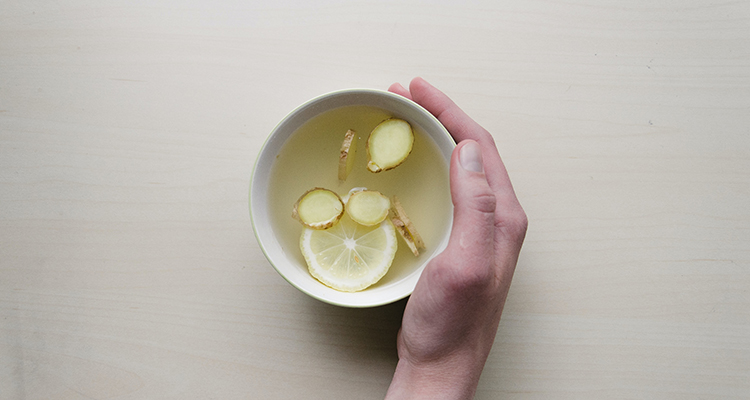
Ginger is a very strong, bright flavor and it’s also popular for brewing a healthy and refreshing tea that can support quality sleep. Ginger itself has many health benefits and can treat a long list of ailments including sore throat, nausea, and certain side effects from chemotherapy. In some forms, ginger also offers anti-inflammatory benefits and high levels of nutritious antioxidants. Ginger tea is naturally caffeine-free, making it perfect for nighttime.
Turmeric
Part of the ginger family, turmeric is an herb that shares many of the same properties and benefits including reduced inflammation and improved digestion. Turmeric contains an active ingredient known as curcumin. Curcumin is a powerful antioxidant and anti-inflammatory compound that also regulates how the neurotransmitters in the brain work. While there’s been little research on the direct effects of turmeric tea on sleep, how it interacts with certain parts of the brain to ease other ailments may, in turn, help you achieve a better night’s sleep.
Turmeric is a strong flavor that is often described as bitter or musky with peppery undertones. For that reason, you may need to add honey, lemon, or other sweeteners to turmeric tea to make it more palatable. You can also create golden milk by combining turmeric tea, honey, milk, and other spices. Because turmeric is naturally caffeine-free, you can enjoy it any time of the day.
Lemongrass
Although the names sound familiar, lemongrass tea and lemon balm tea aren’t the same, although both have their own benefits. While lemon balm is a leafy herb in the mint family, lemongrass is a tall grass with woody, aromatic underlayers. Old wife’s tales claim that lemongrass can boost your immunity, relieve pain, and improve sleep quality. It’s also a popular ingredient in many Asian dishes. Thanks to its strong, citrus flavor, lemongrass also makes a delicious and refreshing tea.
If you’ve ever smelled a citronella candle designed to ward off mosquitoes and other insects, you’ve smelled lemongrass. This ingredient does more than just protect you from bug bites and daytime drowsiness. Lemongrass tea has anti-inflammatory and antimicrobial properties. The antioxidants in lemongrass also support healthy cholesterol levels and healthy digestion.
Lemon Verbena
Another tea on the list that has lemon in the name is lemon verbena. While there’s limited research on this specific type of team, one study done in 2018 reported that participants who took a single dose of lemon verbena syrup before bed not only fell asleep quicker but also slept longer. Many individuals also reported feeling less drowsy the next day. A similar study showed that lemon verbena has other health benefits including reducing muscle soreness and fatigue following exercise. These findings indicate that a cup of lemon verbena tea before bed or before an intense workout could help you recover faster and achieve better quality rest.
Rooibos
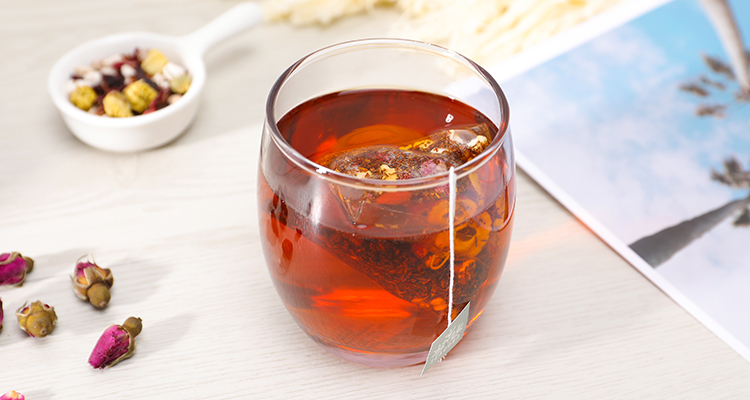
Rooibos tea is packed with healthy minerals and nutrients including magnesium and calcium – two vitamins that are historically linked with quality sleep. These ingredients also give rooibos tea anti-inflammatory and antioxidant properties. For those suffering from joint pain or inflammation, muscle fatigue, or a compromised immune system, ingested before bed, rooibos tea can help ease these symptoms so you can fall asleep faster. Rooibos is a member of the Fabaceae family and boasts a gentle, smooth, and sweet flavor. Its nutty and full-bodied flavor makes this red tea deliciously woodsy and warm.
Honeybush
Honeybush tea is similar to rooibos with its own set of benefits including relief from PMS symptoms (including cramping), improved cholesterol, and reduced cough and congestion. If any of these discomforts are keeping you up at night, a hot cup of honeybush tea might help. Similar to rooibos, honeybush has a nutty, lightly roasted flavor with floral undertones. Honeybush tea is slightly sweeter and more full-bodied than rooibos. Because both are caffeine-free, you can enjoy their soothing benefits both day and night.
Melatonin Tea
You’ve probably heard of the many sleep benefits of melatonin but did you know that melatonin tea existed? Melatonin is a natural sleep hormone that your brain releases at night to help you make the smooth transition from wakefulness to sleep. Because melatonin isn’t a flower or herb that can be brewed into a drinkable tea, you’ll have to add melatonin oil or liquid supplements to your hot tea to experience the benefits. In terms of taste, melatonin is often mixed with lemon in certain teas to boast a bright and refreshing citrus flavor.
Gotu Kola
If anxiety or anxious thoughts are keeping you up at night, Gotu kola tea might help. An herb that’s part of the parsley family, Gotu kola does more than just add aroma or flavor to your next dish. Research shows that Gotu kola actually works to reduce anxiety and treat certain sleep disorders. Gotu kola has also been used for centuries in Ayurvedic and traditional Chinese medicine. This herb contains certain chemicals that are also associated with reduced blood pressure and decreased swelling and inflammation. Gotu Kola is a perennial plant that has no real taste or smell, meaning you can infuse it with other flavors and teas for a pleasant and beneficial nighttime treat.
Kava
Kava tea is made from the Piper methysticum plant found in the Pacific Islands. Unfortunately, its earthy undertones are transferred directly into the tea, which is described by some as “muddy water”. Even the ancient people of Fiji who have drunk kava tea and other kava beverages for centuries admit they don’t enjoy the taste but they love the way kava makes them feel. Kava is praised for helping reduce anxiety while also inducing sleep. The people of Fiji also claim that kava has sedative effects which can combat certain sleep issues and disorders. That is if you can get past the taste and texture.
Tulsi
Last, but not least, on our list of the best tea for sleep is tulsi. Also known as holy basil, this plant is native to India and is praised for its stress-reducing benefits. People have been using tulsi for centuries to help ease feelings of depression, anxiety, and paranoia. In addition, these calming benefits can help users overcome their sleep issues by promoting relaxation and calm.
Tulsi is another strong flavor, bitter flavor. Because it’s part of the basil family, tulsi tea has both floral and peppery notes and is very aromatic. Different types of tulsi will create different flavors. Some tulsi tea is spiced with a clove-like aroma while others are more fresh and lemony. You can also add your own lemon or honey to fit your taste.
Sip Your Way to a Better Night’s Sleep
There’s no quick fix to getting quality sleep. It takes hard work, patience, consistency, and insight. Most of the positive changes you can make are related to your lifestyle choices. For example, setting a sleep schedule, creating a productive sleep environment, and reducing screen time at night.
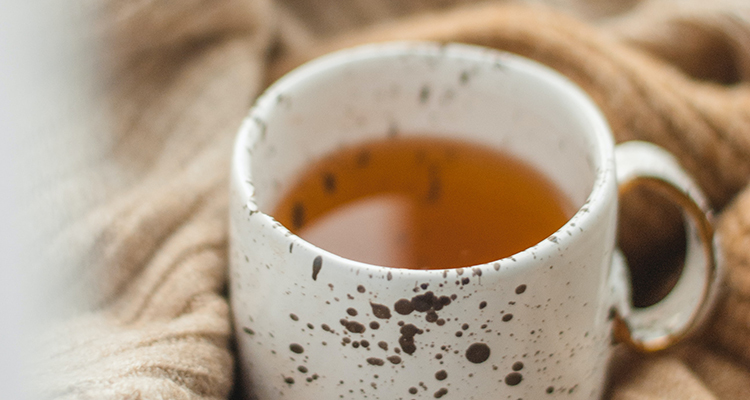
You can also make adjustments to the things you eat and drink. Incorporating any of these teas into your daily routine could promote a better night’s sleep. Whether you’re sipping chamomile or lavender tea before bed or drinking green tea during the day for an added energy boost, these teas can make a big impact on your sleep quality. Try out a few until you find your favorite. And in the meantime, check out the rest of our blog for trending news and helpful insight on all things sleep-related.

